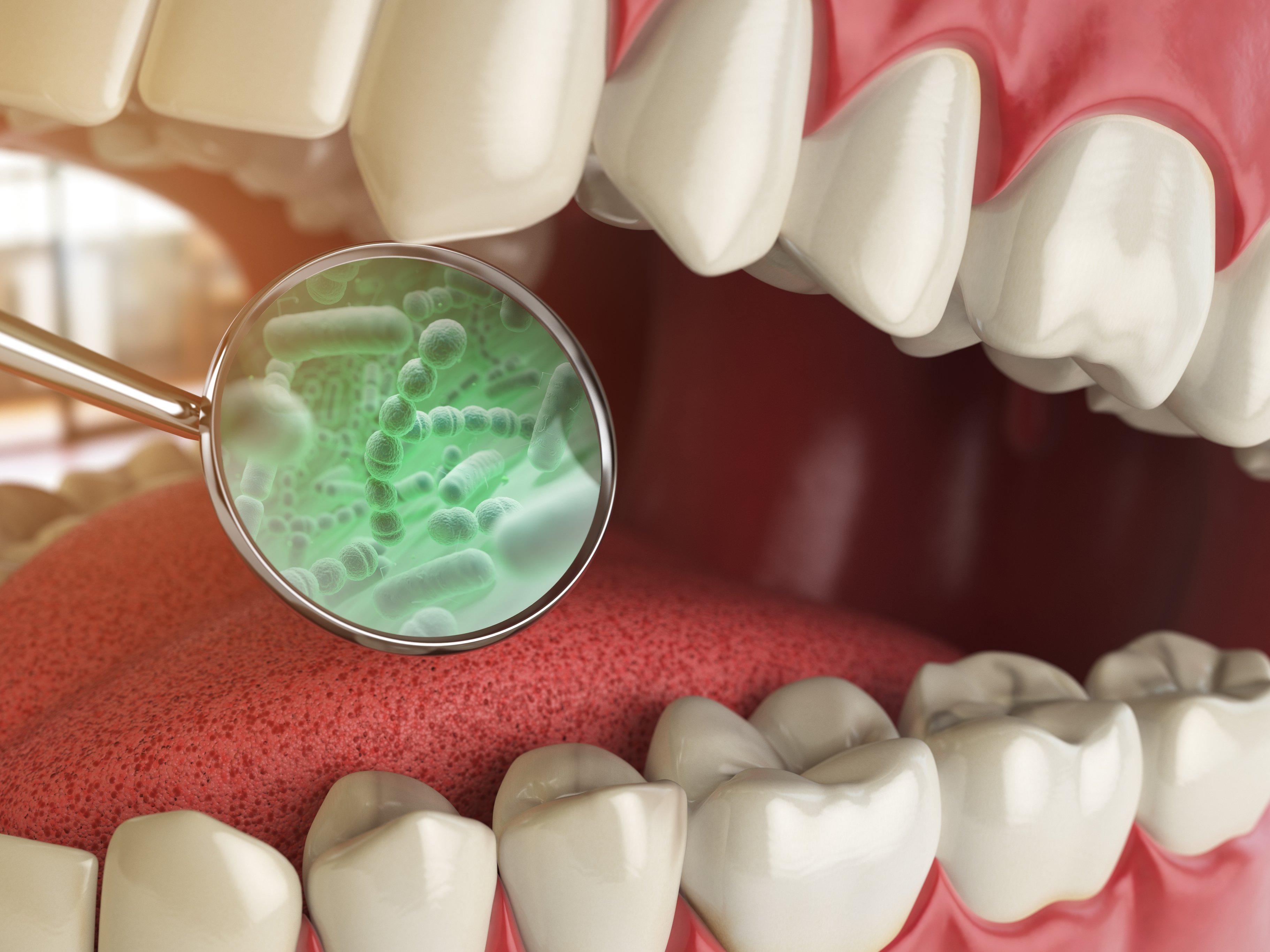
Every time we swallow, every milliliter of saliva contains 100 million to one billion microbes (1).
With the knowledge that so many bugs and their toxins find their way to the bloodstream and the gut from saliva (2) , it’s a tad bit more motivating to think more about the natural ways to promote a healthy mouth in the first place.
Our system is normally protected from unwanted bacteria by the acidity of the stomach from hydrochloric acid production, and in the small intestine from bile acids. Yet the system isn’t perfect, and doesn’t always stop inflammation and toxins from finding their way into the blood from the gums.
Changes in pH in the mouth or in the gut can lead to the growth of unwanted bacteria.
Due to widespread issues with low stomach acid, stomach overwork, an inflammatory diet, and poor dental hygiene – every time someone swallows, they could be seeding their gut with millions of unwanted bacteria and yeast – including potential pathogens, viruses, and more.
The oral microbiome is quite diverse. There are up to 700 species of bacteria in the mouth at any given time (3) – surpassing the 300-500 species of bacteria found in the gut (4). The bacteria in the gums will differ from the bacteria on the lips, as well as the cheek surface, the tongue, or the upper palate.
The nose and mouth are connected, and nasal bacteria like Staphyloccocus aureus can find their way to the gut or irritate a dental abscess.
The teeth are normally the one surface in the mouth not intended to harbor bacteria – so they can become home to bacteria that otherwise are not wanted in the mouth, or they become a site of plaque development.
Most of us are familiar with the conversation around dental plaque…
A high-sugar diet leads to the overgrowth of acid-producing strains of bacteria that degrade tooth enamel, contribute to plaque formation, and set the stage for gingivitis and periodontitis.
With more growth of the acid-producing bacteria such as Streptococcus mutans – the pH change not only leaches calcium from tooth enamel as part of the buffering process – the calcium can only do so much before the mouth becomes increasingly acidic due to the high growth of lactic acid-producing bacteria.
This increasing acidity favors growth of unwanted bacteria including more virulent gram-negative bacteria involved in the progression toward gingivitis and periodontal disease.
Luckily, various herbal extracts mentioned below have been shown to help limit the growth of unwanted gram positive and gram negative bacteria – as well as fungi like Candida.
Breaking the cycle with a healthy diet low in simple sugars and carbohydrates, daily brushing and flossing, and protecting good acidity in the stomach are all key ways to maintain a healthy oral microbiome.
Add factors such as smoking, stress, alcohol, and poor diet, and it’s no wonder that approximately 47% of American adults over the age of 30 have some form of periodontitis, and up to 93.9% have some level of gingivitis (5; 6).
There’s more than just good oral hygiene to promoting a healthy oral microbiome. There are proactive strategies that go beyond brushing and flossing.
Regular hand-washing before eating, or after using the bathroom can also be important to avoid fecal-oral contamination of the GI tract – a significant way that large intestine bacteria can make it to the small intestine and contribute to small intestinal bacterial overgrowth (SIBO).
Yes, poop particles find their way on doorknobs, gas station buttons and pumps, and many other places you may not want to imagine there being hidden poop in your midst. And, then we eat with our hands, or touch our mouth or face – and Voila! – that’s how we get fecal-oral contamination.
SIBO has been normally regarded as large intestine bacteria migrating upwards from leaky valves in the intestines – which can happen, yet an overlooked way to seed the small intestine with unwanted bacteria is through accidental ingestion of fecal microbes from residue being on your hands or as a result of consuming undercooked or contaminated foods.
A number of conditions have been linked to imbalances in the oral microbiome including:
Appendicitis, pneumonia, inflammatory bowel disease, colorectal cancer, rheumatoid arthritis, diabetes, cardiovascular disease, pregnancy complications, brain infection, respiratory infection, as well as lung ,liver, or spleen inflammation (7)
A Swedish study followed a cohort for 30 years and those with higher measures of dental plaque had a higher incidence of autoimmune disease (8).
There are a number of ways to promote a healthy balance of mouth bacteria, and also make sure that your system is protected when imbalances are present.
How to Improve and Maintain a Healthy Oral Microbiome

1. Maintain good oral hygiene with brushing and flossing.
Brush preferably following a meal. Flossing is important to rid material not just between teeth but below the gum line where your toothbrush may not reach. Bonus points if you add tongue scraping to your routine too.
2. Eat a diet low in added and excess sugars and simple carbohydrates.
Bacteria in your mouth consume the sugars, promoting the growth of unwanted strains and an increase in the acidity of the mouth – the body buffers this acidity with calcium release from the tooth enamel leading to decay.
Eventually, the calcium release is not enough to buffer the acidity and more pathogenic strains behind gingivitis and periodontitis can start to grow as the oral environment becomes more favorable to their growth.
Yeast such as Candida albicans also consumes sugar and its growth can be promoted in the mouth, esophagus, and small intestine.
Bacteria, Candida, and their toxins can become ingested in the gut, or become systemic due to the vicinity of the blood supply in the gum pockets.
Those who brush their teeth regularly have demonstrated lower Candida levels in their stool (9)
It can all be started by something as simple as a high sugar diet followed by poor dental hygiene.
3. Consume alcohol responsibly.
Too much alcohol is antiseptic and can kill wanted bacteria – plus it’s a source of energy for unwanted microbes. Alcohol is often consumed in carb-heavy beer, wine, or clear liquors with sugary liqueurs and mixers which can feed bacteria and yeast.
The breakdown product of alcohol is acetaldehyde which is highly toxic and creates a systemic inflammatory state and depletes you of valuable antioxidants like glutathione. We use Trizomal Glutathione or N-Acetyl Cysteine – a glutathione precursor that also works as a biofilm disruptor in addition to its support of glutathione levels.
Nattokinase may help support alcohol and acetaldehyde metabolism as well (10).
4. Proactively maintain a good balance of microbes in the mouth with the help of oral supplements, tongue scraping, and microbially-active toothpaste.
- I use the new oral spray MegaCidin, which combines herbal extracts from oregano, grapeseed, black walnut, tea tree, echinacea and others, with the bacillus spore probiotics Bacillus subtilis and Bacillus coagulans to support a normal oral microbiome.
- Dentalcidin is a supportive toothpaste containing similar microbe-balancing ingredients.
- For more pronounced oral imbalances, the liposomal rinse Dentalcidin LS can help penetrate the harder to reach nooks and crannies of the oral mucosa and gums for more complete support.
- Scraping the tongue daily with an antimicrobial copper tongue scraper can promote fresh breath, and help to balance the microbial environment of the mouth. You can also scrape the inside of your cheeks.The copper scraper is naturally antimicrobial and can be used over and over again.
5. Maintain good bile flow.
Support bile flow with srategies such as intermittent fasting, or a supportive supplement such as MegaGuard, Milk Thistle, or an herbal combination such as Lipotropic Complex by Integrative Therapeutics.
Bile acids are antimicrobial in nature and bile flow can get sludgy with SIBO, leaky gut, and gastrointestinal overwork and inflammation. You can also supplement with bile acid salts, but intake levels can be touchy as excess can cause diarrhea.
6. Maintain good acidity in the gut.
I’ve previously reviewed natural ways to boost and maintain stomach acid levels. Betaine HCl with Pepsin or apple cider vinegar taken with meals can help acidify the stomach and maintain digestion.
7. Treat H. pylori when overgrown and irritating the stomach mucosa and lining
H. pylori growth can be triggered by pH changes (low stomach acid) in the first place, yet it then works to maintain the altered pH environment by further limiting your ability to produce normal levels of acid and enzymes.
Recent research has shown that H. pylori can also live in the oral mucosa (10) – making dental hygiene important to prevent H. pylori overgrowth or infection, as well as mitigate risk of recurrence.
8. Treat stress seriously
Stress inhibits immune activity and also overrides “rest and digest” signals of the body – contributing to impaired bile flow, acid and enzyme secretion, as well as degradation of the stomach and intestinal linings.
Take periodic 10-14 day breaks from coffee. Watch chocolate intake. Watch for hidden sources of wheat and cow’s milk in your diet. Alcohol is used as a relaxant but it also is a source of cortisol release.
High stress can reduce saliva production as well. And, although saliva contains mouth bacteria, it also contains enzymes and immune cells that start the process of digestion and immune protection.
9. Open up a capsule of a probiotic that contains Lactobacillus salivarius and swish to help seed the oral microbiome.
L salivarius is the keystone species of healthy bacteria in your oral cavity. It will be killed by stomach acid in terms of having an effect on the gut, yet thrives in the oral mucosa. Swish with the powder for oral bacteria support.
TruFlora by Masters Supplements contains L. salivarius and spore probiotics and can be used in this fashion. You can swallow after swishing.
For gut support, it’s important to take Truflora in its capsule so that the vulnerable strains are protected from the acidic stomach. When you swish, you’re not concerned about stomach acidity, as the aim is to support the oral microbiome – yet you can safely swallow the powder after swishing and it will offer some immune support as well, as the spore microbes will be able to reach the gut unscathed
10. Perform comprehensive microbiome stool testing to evaluate the health, stability, and diversity of your gut microbiome.
A microbiome that is rich in diversity, that mirrors a range of strains known to be healthy, and that is a highly competitive and stable ecosystem will resist opportunistic overgrowth – just like a healthy rainforest does not allow the spread of weeds – your microbiome needs a healthy ecosystem.
We can now measure with high accuracy and profound insights on the metabolic tendencies of your microbiome using BiomeFx from Microbiome Labs. Testing can be performed without a prescription and a number of resources are available for help with interpretation.
Personalized microbiome analysis is the latest way too customize a gut strategy and give you feedback ass to how your efforts are improving the diversity and stability of your microbiome.
As a result of high competitive diversity in your gut, microbes introduced through the mouth and nose will be less likely to grab a foothold.
Promoting the health of the oral microbiome can be an essential component of a gut-healing protocol as the mouth can be a source of recurrent dysbiosis and overgrowth in the gut.
Related Links:
- MegaCidin Oral Throat Spray – Microbiome Labs
- Dentalcidin Toothpaste
- Dentalcidin LS Liposomal Oral Care Solution
- Truflora by Master Supplements
- The Domino Effect of Low Stomach Acid on the Gut Microbiome
- Personalized Microbiome Analysis
- SIBO Articles
- Taking Probiotics
- Antimicrobial Copper Tongue Scraper
- Support Immunity Naturally with these 10 Foundational Strategies

